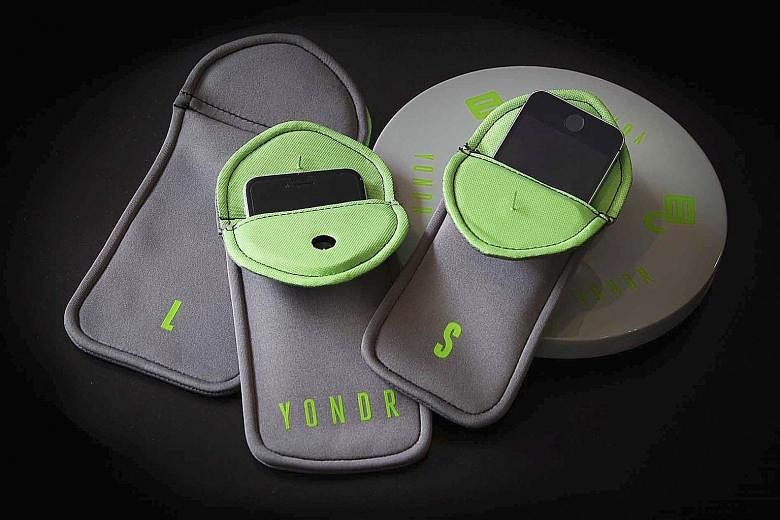NEW YORK • Comedian Dave Chappelle used to hate it when fans would pull out their smartphones during his act, record the performance and post it on YouTube and social media before the show had even ended. To him, the fans seemed more interested in getting the perfect shot than in appreciating his stand-up routine.
But late last year, he discovered the device, Yondr. Fans are required to place their mobile phones into Yondr's form-fitting lockable pouch upon entering the show and a disk mechanism unlocks it on the way out. Fans keep the pouch with them, but it is impossible for them to snap pictures, shoot videos or send text messages during the performance while the pouch is locked.
"I know my show is protected and it empowers me to be more honest and open with the audience," Chappelle said. After his first phone-free performance, he was sold and now insists on deploying Yondr at all his shows.
Other entertainers have since used Yondr, including Alicia Keys, Guns N' Roses, Maxwell, and actor, musician and comic Donald Glover, who goes by the stage name, Childish Gambino.
Of course, an artist or venue can always state that phone use is not permitted and trust fans to comply. But often people rebel.
A phone-free event "is a very different experience", said Mr Graham Dugoni, 29, who founded Yondr.
Mr Chad Taylor, who manages Glover, among others, said: "It's hard to meet people in the room when you're busy texting friends who aren't there."
He added: "It's hard to enjoy a concert experience when you're looking at it through an iPhone camera and trying to get the best shot."
When rocker Axl Rose reunited with former Guns N' Roses bandmates Duff McKagan and Slash for the first time in 23 years, the concert was phone-free.
"It was wonderful," McKagan said of the first reunion show in April in Los Angeles. "It was the old-school feeling, where people were dancing and getting down. It was really cool."
It was different from a concert he did with his other band, Loaded, a few years ago in Cordoba, Argentina. "I started playing and I was staring into a sea of iPads and bright lights," he said. He abruptly stopped the show and asked people to put away their devices, at which point the show improved vastly, he said.
Lesser-known bands might be more hesitant to try Yondr, as many rely on fans posting photos and videos to promote their shows.
Some fans object to not being able to disseminate and see live shows.
"If there were no cellphones and you couldn't capture any video, it would be disappointing," said Philadelphia music fan Steve Dintino, who videotapes every concert he attends. He started filming shows in 1994 after attending a Frank Sinatra concert in Atlantic City, where he yelled "I love you Frank" from the front row and Sinatra responded "I love you too, pal".
A friend recorded the show, so he has the audio of that concert. Ever since, Mr Dintino tries to capture every concert that he goes to.
The ability to see it happening live from the comfort of your living room "is incredible", said Mr Chris Kooluris of Manhattan, a hardcore music fan who has been to dozens of live shows and watched others online through Periscope, Twitter's video feature.
"I stayed up all night long looking for Periscope feeds of the Guns N' Roses show in LA," he said.
But when attending live shows, he said he prefers to see fewer mobile phones. To resolve this issue, he suggests that bands allow one person to videotape the show and give ticket-holders access to the feed afterwards.
But Yondr is not only for concerts. The company has been renting its devices to schools, restaurants and wedding venues as well as to movie studios for pre-screening events - in the United States and abroad.
In the future, it could also be used during live theatre performances, at sporting events such as golf tournaments and in spas and movie theatres, Mr Dugoni said.
With US$15,000 in his pocket, he set out to build Yondr. He spent about six months sketching designs, experimenting with 40 fabrics and locking devices, visiting hardware stores and consulting manufacturers in China, before developing a prototype in 2014.
But getting seed money to manufacture Yondr was a challenge. Silicon Valley investors thought the idea of phone-free events was preposterous and almost laughed him out of the room.
"They just didn't get it," he said. Undaunted, he turned to his hometown of Portland, Oregon, where he raised US$100,000 from angel investors.
"I thought the idea had legs and great market potential," said Mr Tony Arnerich, one of Yondr's investors and a family friend. The company raised US$75,000 (S$104,200) more last year.
Yondr makes money by renting the devices for US$2 a case each day, although it offers discounts for large quantities or for schools that use them for extended periods.
Its first paying job was last year and, within six months, it had turned a profit, Mr Dugoni said. The device has been used in 57 venues and 300 schools this year - up from five venues last year.
Comedy Works, which has showcased comedians such as George Lopez and Wanda Sykes, has been using Yondr at its two clubs in Denver since May. "All of the big artists have said, 'Wow. Thank you. This is amazing,'" said its owner, Ms Wende Curtis. Patrons have asked if they could buy the device for their homes, she said.
Some fans have been disgruntled. A few demanded refunds rather than give up their phones, Ms Curtis said. And one drunken party of eight "got nasty" and posted complaints on social media, she said.
NYTIMES

